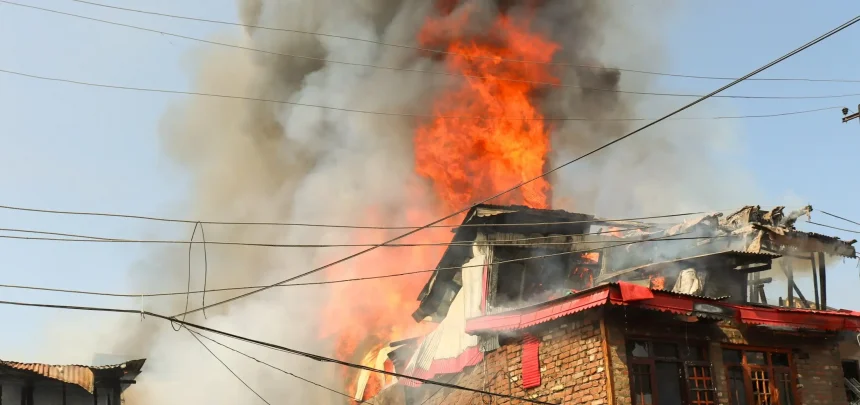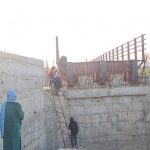Srinagar, Apr 05: Even as fire-related incidents continue to rise in Srinagar, many private coaching centres across the city continue to operate without basic fire safety measures — putting the lives of thousands of students at risk.
Over the past few years, the city has witnessed a rise in private coaching institutes offering specialised courses for aspirants of competitive exams like NEET and JEE. This has led to a growing coaching culture in the region, with areas like Rajbagh, Parraypora, and Karan Nagar emerging as educational hubs. Parraypora, in particular, has earned the moniker “Kota of Kashmir”, attracting students from across the valley.
However, despite this boom, fire safety remains a neglected aspect in many of these institutions. Several centres are operating in congested multi-storey buildings with no fire exits, no smoke detectors, and no fire extinguishers — making them highly vulnerable in case of an emergency.
To tackle such issues, the Ministry of Education (MoE) in January 2024 introduced the ‘Guidelines for Regulation of Coaching Centres’, which laid out mandatory norms for all coaching institutions across India. As per these guidelines, it is compulsory for every coaching centre to possess fire and building safety certificates, along with proper electrification, lighting, and ventilation systems. Additionally, coaching centres must be equipped with essential fire safety equipment, such as fire extinguishers, smoke detectors, and emergency alarms, to ensure the safety of students in case of a fire-related emergency.
The guidelines also include provisions for strict penalties in case of non-compliance. Coaching centres found violating the norms can face fines of Rs 25,000 for a first offense, which can increase to Rs 1 lakh for repeated violations. Persistent negligence may even lead to deregistration, effectively barring them from operating.
Despite these clear regulations, enforcement on the ground appears to be lacking in Srinagar. Many parents have expressed concern over the poor implementation of these safety norms.
“We trust these coaching centres with our children, but there’s hardly any accountability when it comes to safety,” said Shabir Ahmad, a parent from Batamaloo. “Some of these centres are packed with students and have just one narrow staircase. In case of a fire, it would be chaos.”
Rifat Mir, whose son attends a coaching centre in Karan Nagar, echoed similar fears. “There are no fire drills, no alarms, no emergency exits. We’ve raised concerns, but nothing changes. It feels like safety takes a back seat once fees are collected.”
Khurshid Khoja, President of the Parents Association of Private Schools Kashmir (PAPSK), said the issue of student safety cannot be treated as an afterthought. “Every day, hundreds of students attend coaching centres that often operate from overcrowded, poorly designed buildings with minimal or no fire safety infrastructure. We are putting young lives at serious risk,” he said.
Khoja emphasised that parents are not just paying for education but also trusting institutions to offer a safe learning environment. “When that trust is broken due to negligence, it creates fear and anxiety among families. We’ve already witnessed tragedies elsewhere in the country due to fire hazards in coaching centres. We cannot afford to wait for something similar to happen here.”
He called on the administration to step up inspections, ensure strict implementation of the guidelines, and penalise violators. “There can be no compromise when it comes to the safety of our children,” he stressed.
Meanwhile, Haamid Mufti, President of the Coaching Centres Association of Kashmir, admitted that many centres still fall short of meeting basic safety requirements. “It is a fact that several coaching centres continue to operate without adequate fire safety measures, and that is deeply concerning. Negligence of this kind is unacceptable and must be addressed immediately.”
He appealed particularly to smaller centres to take the matter seriously. “Education is essential, but not at the cost of a child’s life.”
He further urged coaching centre operators to adhere strictly to Standard Operating Procedures (SOPs), emphasizing that these are safeguards, not optional checklists. “Authorities, too, need to step up by conducting regular inspections and launching awareness campaigns. We all share the responsibility to protect our students.”
As Srinagar continues to witness a rise in the number of private coaching centres, stakeholders agree that student safety must become a top priority. Without proper implementation of safety guidelines and robust enforcement mechanisms, the risk of a tragic incident looms large.
Despite regulations, many coaching centres in Srinagar ignore fire safety norms

Leave a Comment
Leave a Comment








